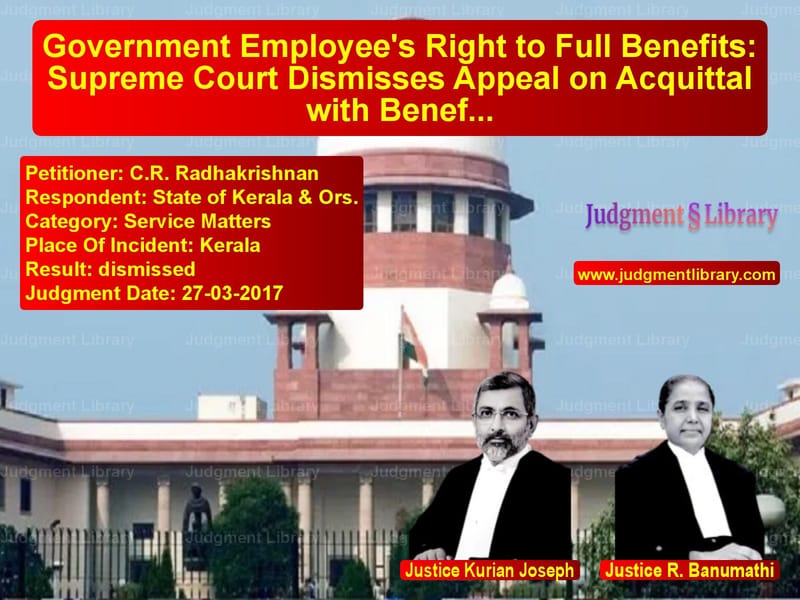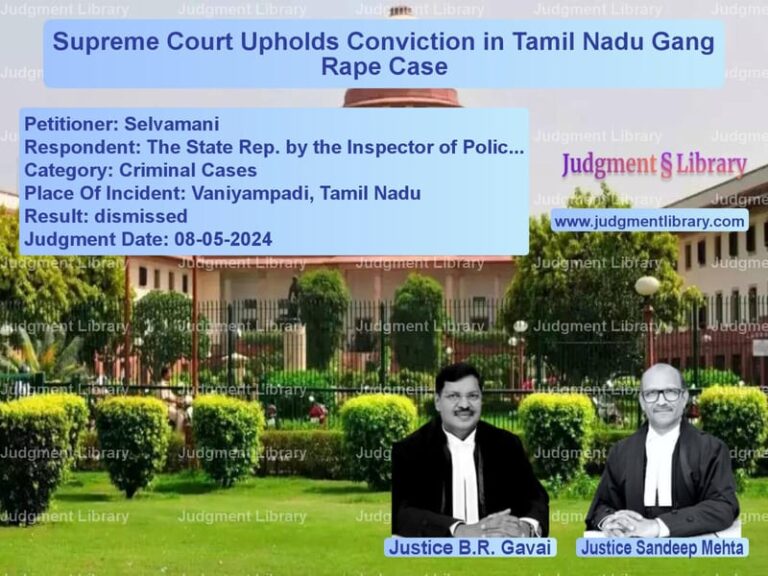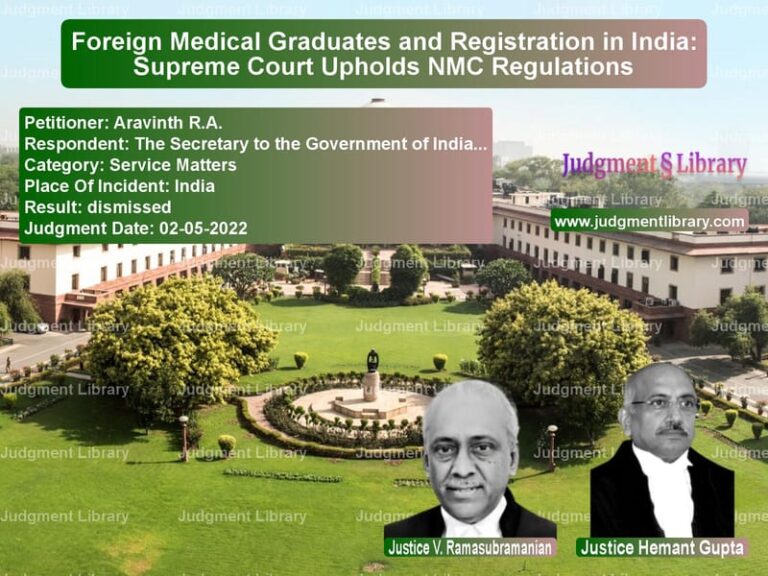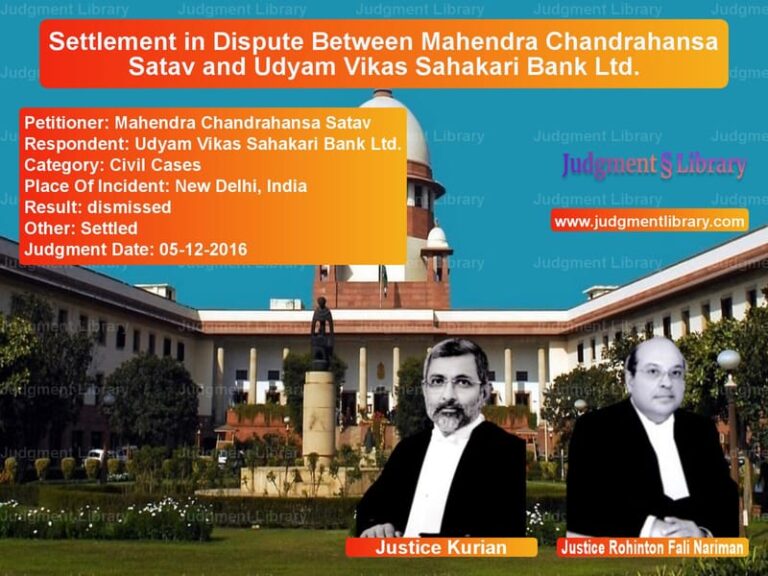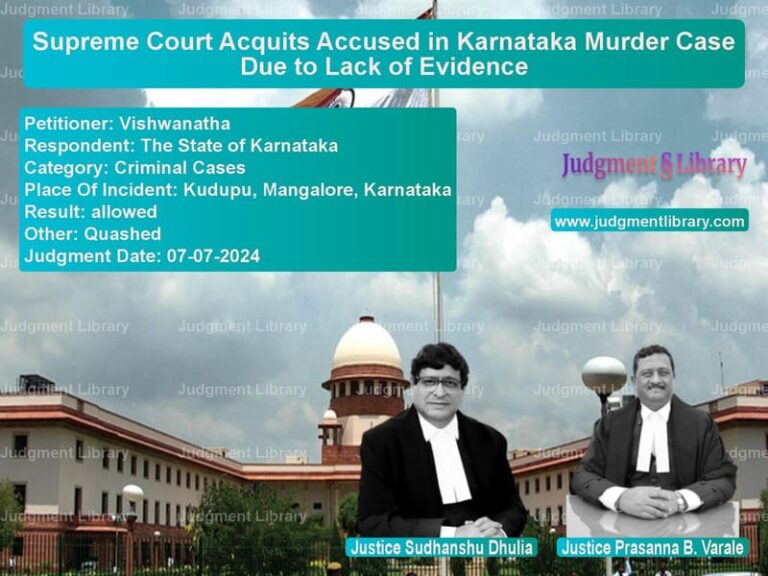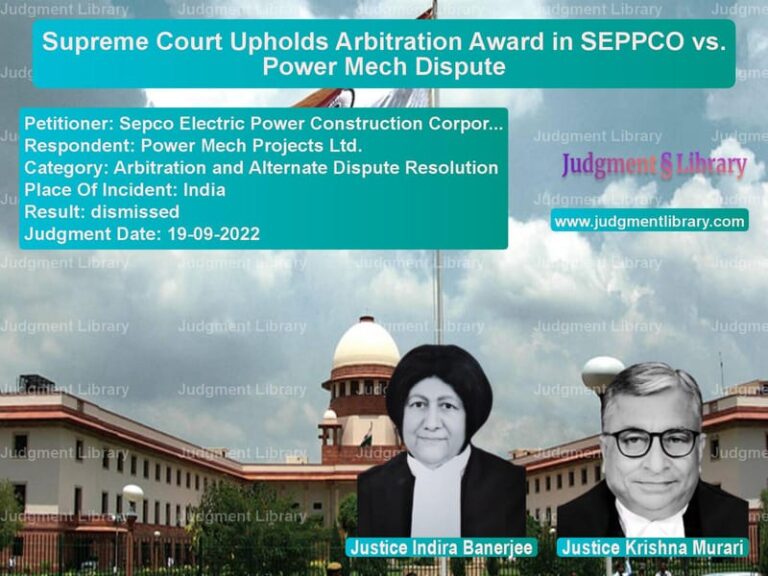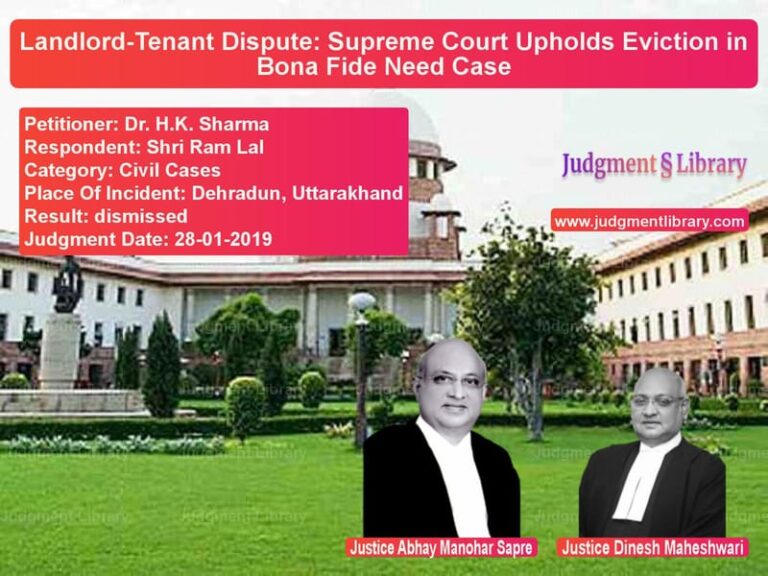Government Employee’s Right to Full Benefits: Supreme Court Dismisses Appeal on Acquittal with Benefit of Doubt
The case of C.R. Radhakrishnan v. State of Kerala & Ors. revolves around a government employee’s claim for full service benefits following his acquittal in a criminal case. The appellant, C.R. Radhakrishnan, had been dismissed from service following his conviction. However, after being acquitted on appeal, he sought full reinstatement with all service benefits. The Supreme Court had to determine whether an acquittal on the basis of benefit of doubt entitles an employee to full service benefits under the Kerala Service Rules (K.S.R.).
The Supreme Court, after considering the relevant provisions, dismissed the appeal, stating that the acquittal was not an “honourable acquittal” but was instead granted on the basis of benefit of doubt. Therefore, the appellant was not entitled to full service benefits.
Background of the Case
The appellant, C.R. Radhakrishnan, was dismissed from government service after being convicted in a criminal case. However, his conviction was overturned by the High Court on 31.07.2000 in Crl.A. No. 298 of 1995. The High Court’s judgment stated:
“On a close scrutiny of the oral and documentary evidence, I can find that the prosecution failed to conclusively prove the guilt of the accused beyond all reasonable doubt. Therefore, the benefit of doubt has to be given to the accused and he is to be acquitted. The conviction and sentence are liable to be set aside.”
Following this acquittal, the appellant sought full service benefits under Rule 56 of the Kerala Service Rules (K.S.R.), arguing that his acquittal should be treated as complete exoneration, entitling him to full pay and allowances.
Petitioner’s Arguments
The appellant argued:
- Since his conviction had been overturned, he should be reinstated with full service benefits.
- Under Rule 56 of the K.S.R., when an officer is reinstated following an acquittal, they are entitled to receive full pay and allowances for the period of absence.
- The High Court’s acquittal meant that he had been wrongfully dismissed and should be compensated for the lost service period.
- The finding of “benefit of doubt” should not affect his entitlement to full service benefits, as the prosecution had failed to prove its case.
Respondents’ Counterarguments
The respondents, representing the State of Kerala, countered:
- The appellant’s acquittal was not an “honourable acquittal” but was instead based on benefit of doubt.
- Under Rule 56(2) of the K.S.R., an employee is entitled to full benefits only if they are “fully exonerated,” which was not the case here.
- The service rules required an explicit determination that the officer had been completely cleared of all charges before full benefits could be granted.
- Since the appellant was acquitted on benefit of doubt, he did not meet the requirement of “full exoneration” under the rule.
Supreme Court’s Judgment
The Supreme Court, comprising Justices Kurian Joseph and R. Banumathi, delivered the following key observations:
- Rule 56 of the K.S.R. governs the reinstatement of officers who have been dismissed, removed, or compulsorily retired and later acquitted.
- Rule 56(1) requires the competent authority to make a specific order regarding pay and allowances, considering whether the period of absence should be treated as spent on duty.
- Rule 56(2) explicitly states that an officer who has been “fully exonerated” is entitled to full pay and allowances.
- The Court noted that the High Court’s judgment in the criminal appeal did not fully exonerate the appellant but rather acquitted him on benefit of doubt.
- Since the appellant was not “fully exonerated,” he did not qualify for full service benefits.
- The correctness of the High Court’s decision in the criminal appeal could not be examined in the present proceedings.
The Supreme Court ruled:
- The appeal was dismissed.
- The appellant was not entitled to full service benefits.
- Pending applications, if any, were also disposed of.
- No costs were imposed.
Key Legal Takeaways
This ruling clarifies several legal principles regarding reinstatement of government employees:
- Distinction Between Honourable Acquittal and Acquittal by Benefit of Doubt: Employees are entitled to full benefits only if they are completely exonerated, not if they are acquitted on technical grounds or benefit of doubt.
- Scope of Rule 56 of K.S.R.: The rule provides that reinstatement does not automatically confer full benefits unless the competent authority determines full exoneration.
- Role of the Competent Authority: The authority reinstating an employee has the discretion to decide whether the period of absence should be treated as duty and whether full benefits should be granted.
Implications for Future Service Matters
This judgment will influence future cases involving government employees seeking reinstatement:
- Employees acquitted on benefit of doubt may not be automatically entitled to full service benefits.
- Reinstatement under Rule 56 does not guarantee retrospective service benefits.
- Authorities must carefully assess whether an employee’s acquittal constitutes full exoneration.
Conclusion
The Supreme Court’s judgment in C.R. Radhakrishnan v. State of Kerala & Ors. reaffirms that an acquittal on benefit of doubt does not equate to full exoneration. Therefore, government employees seeking reinstatement must establish that they have been completely cleared of all charges to claim full service benefits. This decision serves as an important precedent in service law, ensuring that only employees who are truly exonerated receive full reinstatement benefits.
Don’t miss out on the full details! Download the complete judgment in PDF format below and gain valuable insights instantly!
Download Judgment: C.R. Radhakrishnan vs State of Kerala & Or Supreme Court of India Judgment Dated 27-03-2017.pdf
Direct Downlaod Judgment: Direct downlaod this Judgment
See all petitions in Employment Disputes
See all petitions in Pension and Gratuity
See all petitions in Disciplinary Proceedings
See all petitions in Judgment by Kurian Joseph
See all petitions in Judgment by R. Banumathi
See all petitions in dismissed
See all petitions in supreme court of India judgments March 2017
See all petitions in 2017 judgments
See all posts in Service Matters Category
See all allowed petitions in Service Matters Category
See all Dismissed petitions in Service Matters Category
See all partially allowed petitions in Service Matters Category

